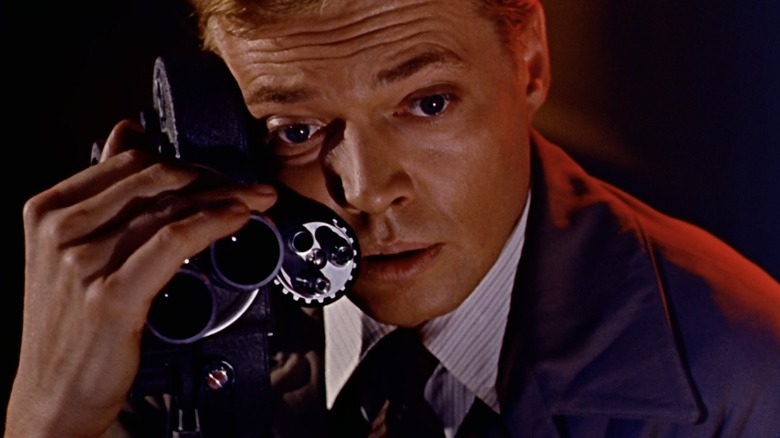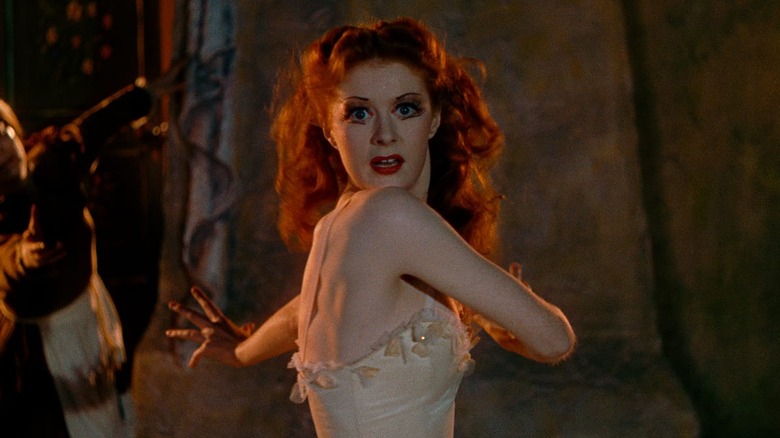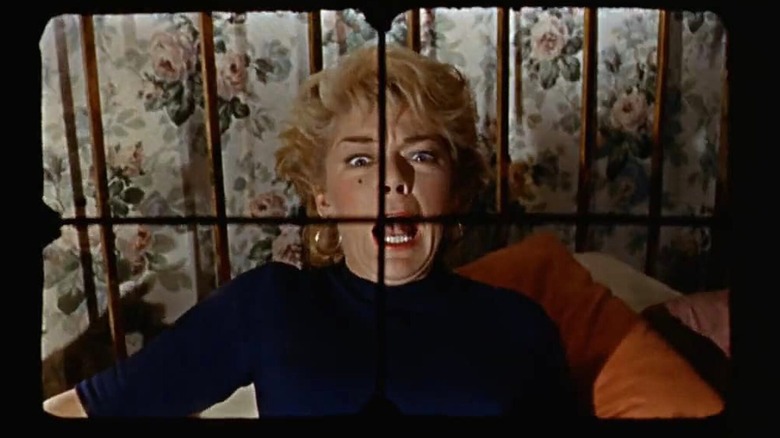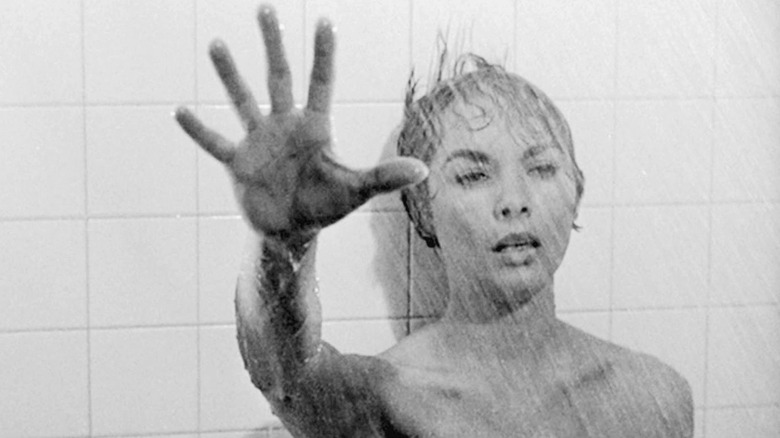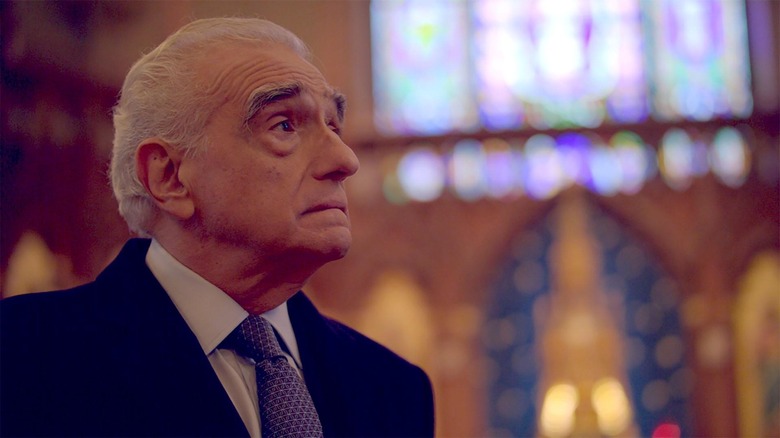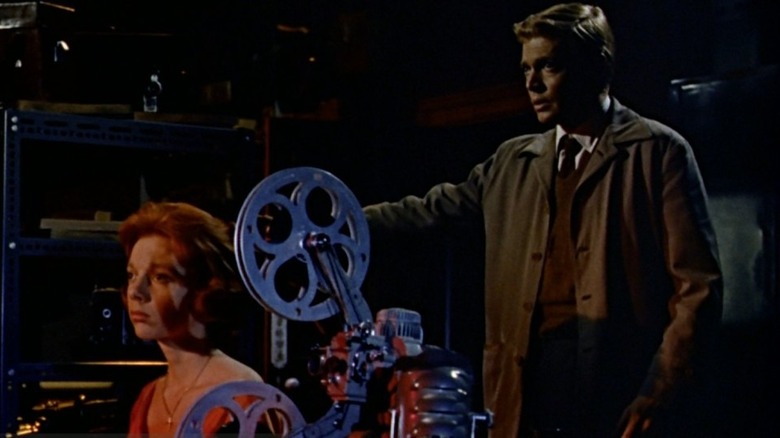The Peeping Tom Controversy Explained: How Martin Scorsese Helped Save A Forgotten Gem
The act of watching goes hand in hand with cinema, and one filmmaker who examined the mix of voyeurism and violence that makes cinema so enrapturing was Michael Powell. Powell's 1960 film "Peeping Tom" focuses on Mark Lewis (Karlheinz Boehm), a documentarian serial killer. Mark films his victims, all young women, at their moment of death to capture primal fear in celluloid.
Powell's film was soundly rejected in its day and ended his sterling reputation in the UK; he only directed five largely forgotten films in the next three decades. But thanks to championing by figures such as Martin Scorsese, "Peeping Tom" found its audience and is now remembered as a classic. Why was the film so panned upon release, and how did its reputation recover? Let's dig in.
Who was Michael Powell?
Powell rose to fame in the British film industry throughout the 1940s and 50s, but he didn't do it alone. During this period, he was part of a directing duo alongside Emeric Pressburger. The two were known simply as "Powell and Pressburger," and their most fondly-remembered films include "The Red Shoes," an adaptation of a Hans Christian Anderson fairy tale, and "Black Narcissus," a psychological thriller about British missionary nuns who comes down with cabin fever in the Indian Himalayas.
Both films are remembered for their gorgeous technicolor palettes and detailed matte painting backgrounds. The "Black Narcissus" shoot never left England, but the production design convinces you of the Himalayan setting. "Black Narcissus" also borders on horror, which Powell jumped headfirst into with "Peeping Tom."
After directing "Ill Met By The Moonlight," Powell and Pressburger amicably parted ways. The former's next project was based on a script by cryptographer-turned-playwright Leo Marks. This project became "Peeping Tom." However, Powell was in for a nasty shock once his film arrived in the cinemas.
The original reviews of Peeping Tom
Film critics of 1960 didn't dislike "Peeping Tom" — they were revolted by it. Writing for The Observer, critic C.A. Lejeune wrote, "It's a long time since a film disgusted me as much as Peeping Tom." Nina Hibbin called the film, "Wholly evil." The film had no better luck overseas; when Astor Pictures distributed the film in America in 1962, the Catholic Legion of Decency deemed it objectionable.
Why such a negative reaction? For one, this was an era before slasher movies. To have a film where the main character was a serial killer was new, disturbing ground, and some critics couldn't handle it. Aesthetically, "Peeping Tom" was also too lurid. Martin Scorsese articulated how its garish Eastmancolor photography and images of scantily-clad women evoked "porno magazines."
For the 50th anniversary of "Peeping Tom," John Patterson wrote in The Guardian that the film's panning stemmed from "the enthusiasm of British critics back then for boringly unambiguous moral seriousness and quasi-documentary realism," or the polar opposite of "the sheer technical and philosophical audacity of 'Peeping Tom.'" British film critic Mark Kermode has also argued the distaste stemmed from how the film invites its audience to empathize with Mark, thereby making them complicit in his killings. "Peeping Tom," as Kermode put it, "[pushed] the buttons of those who had paid to watch something sensational but who found themselves creepily implicated in these photophiliac crimes."
In any case, the film's reception naturally disappointed both Powell and Boehm; the latter recalled at the film's premiere, "We were very surprised that there was no applause at the end of the film... Not one came maybe just to shake hands with us. We were completely stunned."
Peeping Tom and Psycho, birds of a feather
It's interesting to compare the response to "Peeping Tom" with "Psycho," a similar film released the same year. Director Alfred Hitchcock was, like Powell, fascinated by cinema as voyeurism; in "Rear Window," he showed that there's no difference between looking into your neighbor's windows and peeking through the window of an imaginary world via a movie screen.
British critics hated "Psycho" as much as they did "Peeping Tom," but "Psycho" was a commercial success and became a crowd-pleaser. Hitchcock's film grossed $32 million on a $806,947 budget. Why did "Psycho" succeed where "Peeping Tom" didn't? Some of this might be explained by Hitchcock's name having sway over audiences, but not all.
For one, "Psycho" was shot in black-and-white. The blood in the film doesn't appear red, and the classical filmmaking contrasts with the pulpy content. While Mark and Norman Bates are similar characters, both young killers tormented by the spirits of abusive parents, "Psycho" doesn't empathize with Norman the way "Peeping Tom" does with Mark.
Take the famous shower scene where Marion (Janet Leigh) meets her end. The rapid editing thrills, but it also obscures the violence. The footage is shot from an objective, third-person view, keeping a distance between the killer and the audience. "Peeping Tom," on the other hand, opens with a first-person POV shot of Mark killing one of his victims; audiences see the woman staring right back at them in fear as if they're the one killing her.
"Psycho" also has a tidier ending; Norman/"Mother" is foiled and a psychiatrist (Simon Oakland) explains the villain's condition in reassuring (and exhausting) detail. In "Peeping Tom," Mark rejects a chance at redemption with Helen (Anna Massey) and kills himself on camera, completing his snuff film documentary.
Scorsese steps in
Legendary filmmaker Martin Scorsese was introduced to Michael Powell at a young age when he saw "The Red Shoes," which left a, "very strong impression" on him. Many years later, Scorsese got a chance to repay Powell by helping to restore the reputation of "Peeping Tom."
"Peeping Tom" virtually disappeared for two decades after its release. Ian Christie, a film historian and author of "Arrows of Desire: the films of Michael Powell and Emeric Pressburger," has said that during this time "Peeping Tom" was "an underground film." Scorsese first learned of it through fellow filmmaker Jim McBride. Scorsese admits that when he first saw "Peeping Tom," he was taken aback: "Could this have been the same man who made 'The Red Shoes,' made this picture? Could that be?" However, he came to appreciate it, realizing it was the capstone of Powell's fascination with the dangers of art. Talking about the film, Scorsese said:
"Powell dared where no one else had before him, to show us how close movie-making could come to madness, how it could eat you up, he was telling an extremely uncomfortable truth, something no one really wanted to know."
As Scorsese and Thelma Schoonmaker (Powell's widow and Scorsese's go-to editor) recount, Corinth Films approached Scorsese during the production of "Raging Bull." The studio wanted to re-release "Peeping Tom" under the banner, "Martin Scorsese Presents," and offered the director $5,000 for his participation. Scorsese agreed, but threw in one more condition — that he receive a print of the film.
A restored reputation
"Peeping Tom" reopened at the New York Film Festival in October 1979 and was met more warmly. Writing for the New York Times, Vincent Canby said, "What was yesterday's garbage is now being heralded by two of today's critics as 'powerful and moving' and 'at once mischievous and compassionate, ironic and evangelistic, comic and tragic.'" Canby himself is more dismissive, saying that while he isn't offended by the film, he still considers it, "badly-acted" and "a very solemn melodrama." However, history would not side with Canby anymore than it did the British critics who originally panned "Peeping Tom."
Roger Ebert included "Peeping Tom" on his "Great Movies" list. Writing about "Peeping Tom" in 1999, Ebert said:
"The movies make us into voyeurs. We sit in the dark, watching other people's lives. It is the bargain the cinema strikes with us, although most films are too well-behaved to mention it... Other movies let us enjoy voyeurism; ['Peeping Tom'] extracts a price."
In 2004, the British magazine TotalFilm ranked "Peeping Tom" as the 24th best British film ever made. This reappraisal was only so much solace to Powell himself. In his autobiography, Powell wrote: "I make a film that nobody wants to see and then, thirty years later, everybody has either seen it or wants to see it." After all, people recognizing his talent was worth little if he didn't have a career to show for it. However, it's still a good thing for cinema that a daring masterpiece like "Peeping Tom" was able to find its audience.
